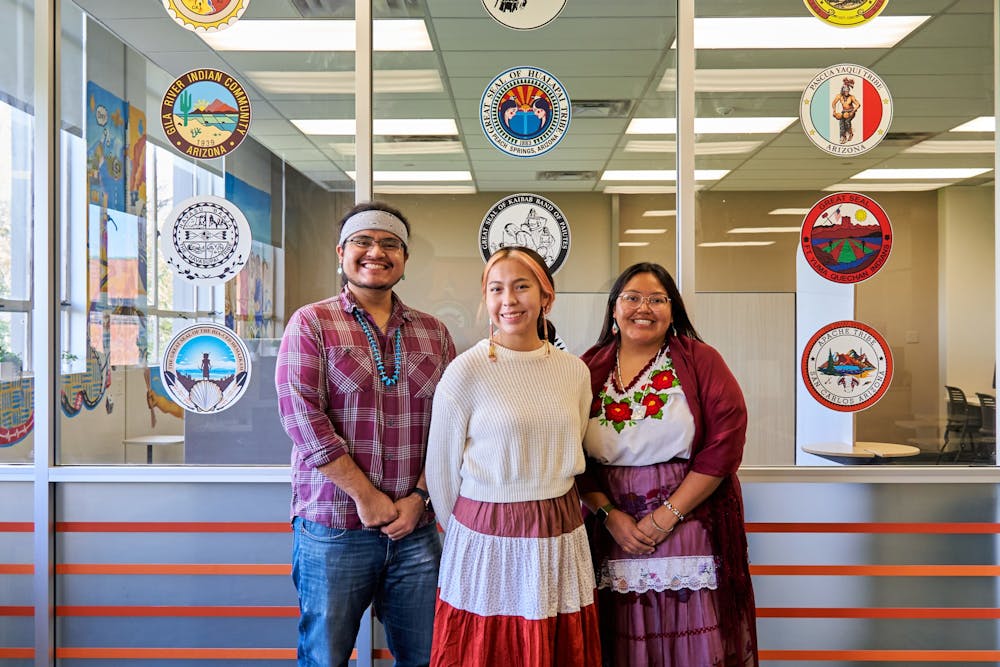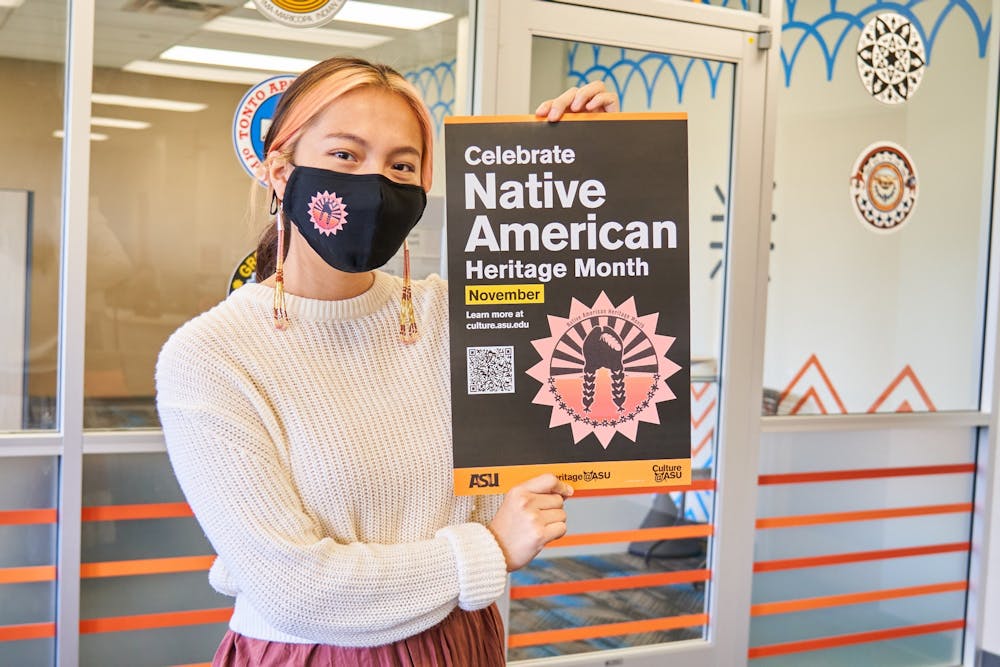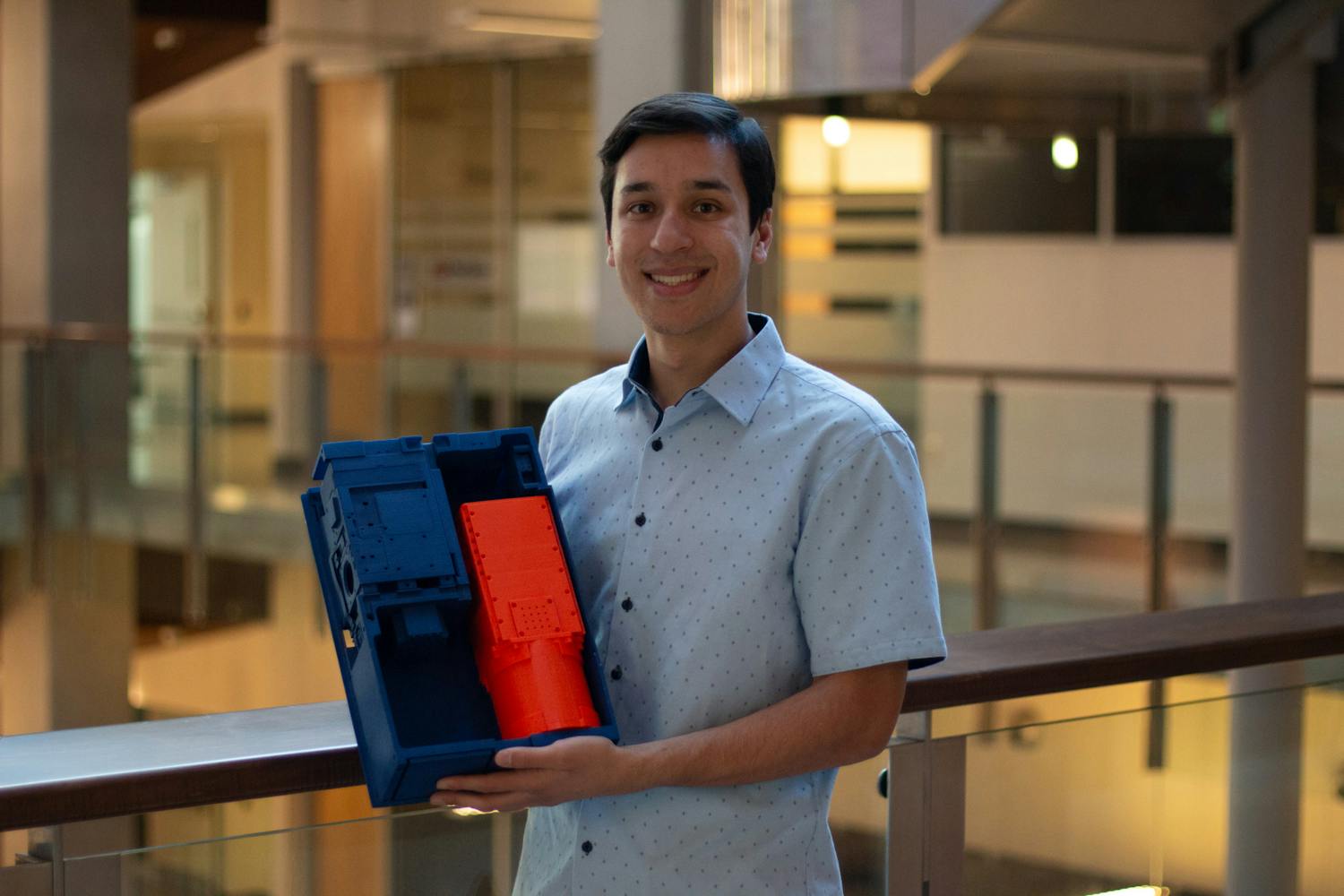November is Native American Heritage Month, and returning from three semesters of remote learning, Indigenous students are striving to connect in-person once again.
Many students endured hardships at the start of the COVID-19 pandemic, struggling to find the resources necessary to attend virtual classes while also supporting their families, communities and themselves.
Now, after nearly two years and many obstacles, Indigenous students are finally reconnecting. This year's theme for Native American Heritage Month at ASU: Reunite, Reignite, Revitalize.
Catalina Alvarez Flores, a senior double majoring in anthropology and family and human development who is part of the Pascua Yaqui Tribe, said the return of in-person events has been really encouraging, and many people are meeting in-person for the first time.
"In the beginning of the semester, we had a blessing, like for the first (day) of the semester to start off well and strong," said Miyana Manus, a junior studying marketing who is Diné, Omaha and Cherokee. "A lot of our Indigenous communities, population here, they just want to be together and hang out and see each other."
Manus also created a design to represent this year's Native American Heritage Month, which she submitted to ASU. Her design was chosen as the University's image to represent the celebrations, and Manus said she is glad that as an Indigenous student, she and her work are being represented on a large scale.
"It's really exciting to see (the artwork) around ASU, it's empowering to see," she said.
Despite appreciating the University's push for recognition of Indigenous voices in the community, she feels the outreach and inclusion of Native American communities can still be improved.
"(The University should) help encourage students to ... come here, maybe more scholarships and funding directly for Indigenous students, because that's a big issue," Manus said. "People on a lot of Indigenous tribes' reservations experience a lot of hardships — financial income is not something that's very abundant on the reservation."
Economic instability was one thing that made the pandemic especially challenging within tribal communities, as deep-rooted struggles with poor federal funding has led to a housing crisis, food insecurity and issues with accessing medical needs.
Reflecting on pandemic hardships
Angela Gonzales, an associate professor in the School of Social Transformation and citizen of the Hopi Tribe, understood firsthand how devastating the pandemic was for tribal communities..
"I know in my village and in my family home, we don't have running water," she said. "So, we were very reliant and have always been reliant on getting water from the well ... So, just kind of the basics of public health guidelines for safety was very difficult."
Gonzales expressed worries about virus exposure within multigenerational households, a concern Manus echoed.
"It was really hard being away from my family and ... experiencing a lot of death in my family, losing a lot of elders, community members that I grew up with who raised me as a child," she said.
Brian Forkum, a junior studying history who is part of the Navajo Nation, said his family nearly became homeless at the end of 2020 due to the pandemic.
"I was like, 'we might not have power for a month. We might not be able to eat,'" Forkum said.
Financial grants and technology loan programs sponsored by the University helped bring some stability to these students' circumstances.
The impact of the ASU work group
Gonzales and Jacob Moore, associate vice president for tribal relations at ASU and member of the Lakota, Dakota, Tohono O'odham Nation and Akimel O'odham tribes, were part of a work group in 2020 which sought to identify struggles within tribal communities during the early stages of the pandemic.
The group was composed of multiple departments working directly with students, including financial aid, behavioral health services and the American Indian Student Support Services, to provide assistance with basic necessities to students and their families.
"When the pandemic started, our concern was that a number of our students were probably more vulnerable," Moore said, pointing to the around 3,500 self-identified American Indian students, representing around 180-200 tribes.
Immediately after ASU went fully online to mitigate COVID-19 spread, the group sent surveys of how Indigenous students needed the most support in their rural communities. Moore said they identified four main areas to focus their energies on: accessing technology, food services, mental health services, and college affordability.
In April 2020, the group met with President Michael Crow and tribal leaders for an in-depth discussion about the tribes' needs and resources the University had to support them. The group donated PPE resources gathered from the University's own stockpile and from their healthcare partners.
When Forkum's family was in a dire situation, AISSS directed him to the Gates Foundation Emergency Fund, which awarded him enough money to keep his family housed.
"That helped out a lot more than I think I was able to write in a one-page, 300-word thank you letter," he said.
The work group also provided mental health services sensitive to cultural nuances and practices, so counselors who weren't well-versed in those specific cultural norms could better serve students.
AISSS has also supported this push for mental wellness among Indigenous students, hosting a talking circle in partnership with Native Health. The talking session is still being held virtually every Thursday from 2-3 p.m., hosted by Claudia Dagnino from AISSS.
"I think it is important to take care of yourself in all ways … spirituality, mental health, things like that," Manus said.
In addition, the groups provided care packages containing both sacred herbs for ritual prayer and health items such as hand sanitizer and masks.
Creating long-term solutions
Like Manus, Alvarez Flores and Forkum are calling on the University to put its promises for more inclusion and representation into action.
They want to see ASU take more concrete actions to recognize the Native peoples from the land ASU occupies, through more funding and scholarships for Indigenous students, as well as continuous conversations about progressing inclusivity and representation of Indigenous communities.
"(Land recognition) is a new thing that has started and it's very great ... It is very important for the people that were on this land, that still are on this land — the Pee Posh and the O'odham," Forkum said.
Alvarez Flores noted many of the conversations and initiatives pushing the needs of the Indigenous community are being had by only the students themselves, and said it's time for the University to take action as well.
"I want to see progress. I want to see meetings," Alvarez Flores said. "A lot of this is fueled by the Indigenous community, fueled by student leaders … pushing what we want as a community. When I graduate, who's going to take up my shoes? Whos going to continue to push this initiative?"
Reach the reporter at cpedrosa@asu.edu and follow @_camila_aldana_ on Twitter.
Like The State Press on Facebook and follow @statepress on Twitter.
Continue supporting student journalism and donate to The State Press today.

Camila Pedrosa is the Editor-in-Chief for The State Press Magazine. This is her fifth semester working with the magazine, and she has previously written for Cronkite News, The Arizona Republic and The Copper Courier.





